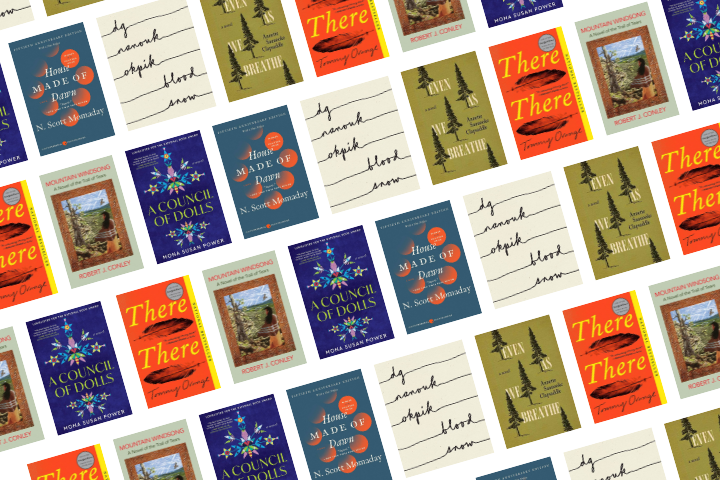
By Oscar Hokeah
Embark upon a literary journey this Native American Heritage Month with a curated reading list by the acclaimed author Oscar Hokeah, winner of the prestigious 2023 PEN/Hemingway Award, the Truman Capote Scholarship Award from IAIA, and the Native Writer Award at the Taos Summer Writers Conference. Hokeah’s selections offer a rich tapestry of Native voices and perspectives. Explore the depth and diversity of Native American literature through this thoughtfully crafted collection, celebrating the profound contributions of indigenous writers to the literary landscape!
1. Mountain Windsong by Robert J. Conley| Bookshop
Mountain Windsong tells the love story of Waguli and Oconeechee, who are young and in love and separated by the tragic removal of Cherokees from traditional homelands in North Carolina. Employing historical fiction, Robert J. Conley captures a largely ignored Native American holocaust referred to as the Trail of Tears (1835—1838). With genuine respect for ancestral legacy, it’s honest, brutal, and filled with strength and hope for the Cherokee people.
2. House Made of Dawn by N. Scott Momaday | Bookshop
House Made of Dawn tells the story of a young Native American man, Abel, who returns to his reservation after serving in World War II. Devastated by post-traumatic stress disorder, Abel finds himself being pulled between an urban modernized existence in the city of Los Angeles and traditional Native Ways of Knowing in his tribal community in New Mexico. N. Scott Momaday not only won the Pulitzer Prize for Fiction in 1969 but he also brought fiction written by Indigenous authors to the forefront in mainstream America.
3. There There by Tommy Orange| Bookshop
There There follows a cast of twelve Native characters as they each travel toward a powwow in Oakland, California. All unknowingly destined to collide in a single life-changing event. Told with unique perspective and eye-opening prose, Tommy Orange’s debut novel wins the PEN/Hemingway Award in 2019, becomes a finalist for the Pulitzer Prize, and begins our newest renaissance in literature for Indigenous authors.
4. Even As We Breathe by Annette Saunooke Clapsaddle | Bookshop
Even as we Breathe tells the story of Cowney Sequoyah who lives in the Smokey Mountains of North Carolina as World War II rips through Europe. Cowney leaves his hometown of Cherokee, NC for nearby Asheville to work at Grove Park Inn, where he faces racism and prejudice when accused of abduction and murder of a young white girl. Annette Saunooke Clapsaddle gives readers a rare story showcasing the Eastern Band of Cherokees, highlighting a complex, beautiful, and often forgotten band of Cherokee people.
5. Blood Snow by dg nanouk okpik | Bookshop
Blood Snow is a poetry collection from Alaskan Native author, dg nanouk okpik, who merges earth, snow, and the human soul to remind readers how inextricably tied we are to our environment, and moreover, how fast our warming planet decomposes physical, emotional, and spiritual health. Told from her Inuit-Inupiat perspective, dg nanouk okpik’s latest poetry collection was a finalist for the PEN/Voelcker Award, a finalist for the Pulitzer Prize, and a winner of the Windham Campbell Literature Prize in 2023.
6. A Council of Dolls by Mona Susan Power | Bookshop
A Council of Dolls follows the lives of three women, each born in a different generation, and brought together by the shared history of colonization of Dakota people. Sissy (1961), Lillian (1925), and Cora (1888) overcome historical trauma with the unrestrained voices from the dolls they carry. In Mona Susan Power’s newest novel, she captures perfectly the psychological mindset of being Indigenous under the weight of an oppressive and genocidal system, and moreover, how resilience and hope heals the modern Native psyche.





